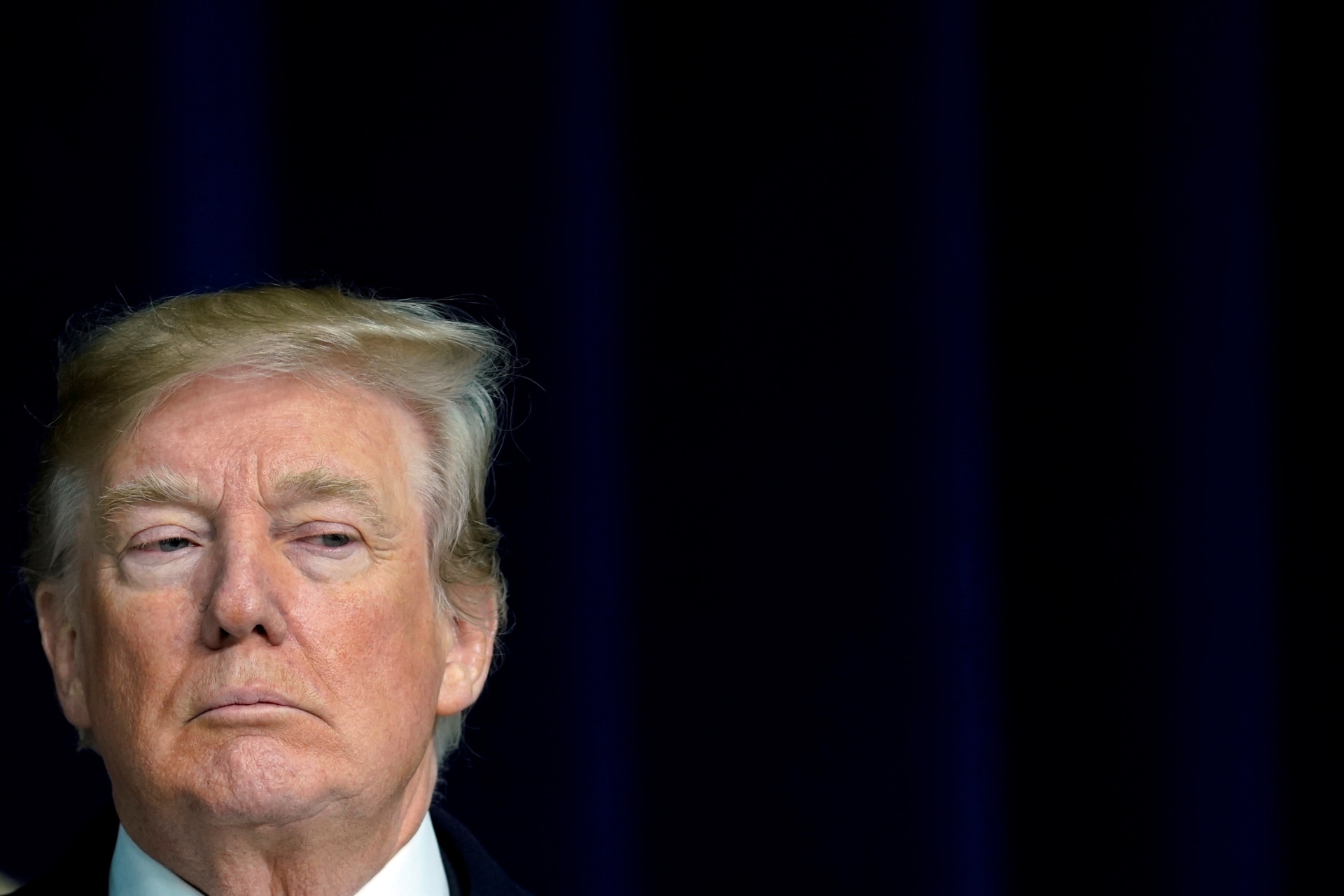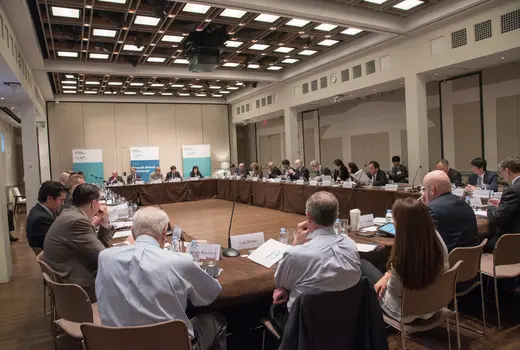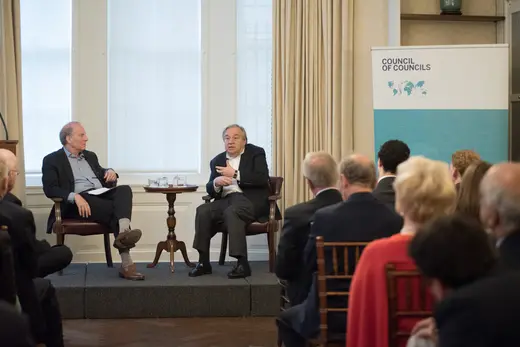Council of Councils Seventh Annual Conference
Insights From a Council of Councils Conference

Overview
Participants discussed how Donald J. Trump’s repudiation of multilateral cooperation undercuts the world’s ability to alleviate transnational challenges, even if other countries step up to fill the void left by the United States.
BY
- The Council of Councils
On May 6–8, 2018, the Council on Foreign Relations (CFR) hosted the seventh annual conference of the Council of Councils (CoC) in New York. The CoC initiative is funded by a generous grant from the Robina Foundation to CFR’s International Institutions and Global Governance program. The views described here are those of workshop participants only and are not CFR or Robina Foundation positions. The Council on Foreign Relations takes no institutional positions on policy issues and has no affiliation with the U.S. government. In addition, the suggested policy prescriptions are the views of individual participants and do not necessarily represent a consensus of the attending members.
Introduction
As the world experiences increasing disorder and returning great power competition, responses to transnational challenges require countries to put aside their rivalries and political differences and work together. At the same time, the United States’ abdication of its traditional global leadership role and its questioning of the liberal world order has complicated prospects for international cooperation. Regardless of the merits of U.S. President Donald J. Trump’s criticisms of global arrangements—from trade governance to the Iran nuclear deal—his repudiation of multilateral cooperation undercuts the world’s ability to alleviate transnational challenges. The seventh annual conference of the Council of Councils held separate sessions on the way forward on trade without U.S. leadership, means to strengthen effective climate change action, the geopolitical implications of technological innovation, and the regional challenge posed by Iran and its global implications. Forty-seven delegates from twenty-two countries discussed these issues.
Trade Without Trump: The Way Forward
Although world trade grew at its fastest pace in six years in 2017, geopolitical competition and escalating trade tensions have increased uncertainty and harmed prospects for future economic growth. Some participants argued that the time had come to reconceptualize the global trade architecture by looking beyond the United States. Other participants disagreed, noting that the United States has a bipartisan history of protectionist measures and that Trump has done exactly what he promised during his campaign. What is different today, others noted, is that Trump’s protectionism is part of his broader rejection of the multilateral order. He is using predatory practices and exploiting the weaknesses of smaller states, including security allies, to extract rent through bilateral agreements. One participant noted that Trump’s policies make partnership with China more attractive to many developing countries. Other participants noted that some of Trump’s complaints about China’s unfair trade practices—particularly the lack of protection for intellectual property (IP) rights and continued restrictions on market access—are well founded. Overall, participants concurred that only collective action, not unilateral measures, could sufficiently pressure China to reduce or limit its market-distorting measures.
Trump’s protectionism is part of his broader rejection of the multilateral order.
All participants agreed global economic growth relies on the certainty provided by the rules-orientated multilateral trading system, and that countries should not only enforce the rules but also adapt them to today’s changing geopolitical and economic structures. While the World Trade Organization (WTO) is still the legitimate body to regulate global trade, it has failed to create new rules and reform outdated ones. The global trading system is also becoming fragmented thanks to the proliferation of bilateral and plurilateral trade agreements. This proliferation and the WTO’s failure to create and reform rules risk marginalizing and discrediting the WTO as a focal point for global trade governance.
One participant argued that middle trading powers such as Australia, Japan, and South Korea had a special role to play in building coalitions to create and enforce a more inclusive, rules-based trading system, particularly given the leadership vacuum created by the U.S. absence. Other countries, particularly EU member states, are also stepping up, advancing their own liberal trade agendas. Though many participants agreed that China is beginning to play a substantive role in trade governance, some suggested it has a long way to go, especially as its domestic economy is still dominated by nonmarket forces.
Recommendations
- Developed and developing countries should not only stick to an agenda of trade liberalization but also reinforce and modernize the rules of international trade, particularly within the WTO.
- Countries threatened by restrictive trade measures that violate international law should prepare to retaliate, if necessary. At the same time, threatened countries should use the WTO dispute system to challenge the legitimacy of unilateral illegal trade measures.
- National governments and international institutions such as the WTO should launch an initiative to link regional free trade agreements. Failure to do so could further fragment and undermine global trade rules and practices.
- National governments should increase the transparency and thus democratic legitimacy of trade negotiations. Steps could include upgrading current consultation mechanisms and making publicly available negotiating documents, proposals, minutes of meetings, and negotiating mandates. Civil society actors should be consulted at every negotiating stage.
- Countries in the Comprehensive and Progressive Agreement for Trans-Pacific Partnership should continue to expand the group’s membership and show leadership in helping to sustain a liberal global economic order.
Strengthening Effective Climate Change Action
The Paris Agreement has made great strides in solidifying global efforts to mitigate the existential threat of climate change. However, conference participants agreed that the accord does not address fundamental issues that will ultimately determine its success. For instance, issues of equity, technology transfer, greater collective ambitions, climate financing, and operational rules of the road have yet to be resolved. Unfortunately, geopolitical differences will likely complicate the resolution of remaining technical and environmental issues.

Participants uniformly considered Trump’s decision to withdraw the United States from the accord to be a huge setback. While Trump’s decision had galvanized countries such as Canada, China, and France and mobilized U.S. subnational actors to proceed with the agreement, the U.S. stance will decrease the accord’s effectiveness. Furthermore, even if countries’ Intended Nationally Determined Contributions (INDCs) are met, overall emissions reductions will be insufficient to hold the earth’s temperature increase below the 2 degree Celsius threshold climate scientists consider critical.
Participants concluded that securing additional climate financing, particularly from private sources, is essential for strengthening mitigation and adaptation efforts. U.S. withdrawal from the Paris Agreement will make this effort more difficult, slowing the transition to a low-carbon future. Several participants stressed that clean infrastructure financing will require new structures and market incentives that will direct private capital—specifically trillions of dollars in pension schemes—toward meeting climate mitigation requirements. The current economic cycle could complicate this scenario, however, because higher interest rates will reduce liquidity.
Several participants argued against any kind of Paris 2.0 accord. The current accord is designed to be a living agreement and contains provisions both to update INDCs and to report and review parties’ efforts.
Recommendations
The Group of Seven (G7) and Group of Twenty (G20) should act on promises to remove fossil fuel subsidies, which have a highly distorting effect on energy markets. Removal of fossil fuel subsidies could free up as much as $400 billion for a move toward a low-carbon economy.
National governments and international institutions should remove barriers to international debt financing that hinder investment in clean energy projects both domestically and internationally. To facilitate long-term debt for green energy financing, some capital restrictions and liquidity requirements need to be relaxed.
Private international financial institutions, multilateral development banks, and host governments need to create risk-sharing arrangements for cross-border investments in climate mitigation and adaptation projects. Over time, the spread of financial instruments, such as green bonds, international infrastructure debt funds, and credit guarantees from multilateral development banks should expand to help lower the cost of debt and investor risk for such projects.
Financial institutions and private companies should disclose climate risks to shareholders and investors to make risks posed by global temperature rise more widely known. The Financial Stability Board guidelines provide a good model.
The WTO should consider measures to make trade and climate efforts mutually supportive. For instance, it could encourage renewable energy by issuing a climate waiver for subsidy rules.
Geopolitical Implications of New Technology
In today’s interdependent world, technologies that were once the preserve of powerful states are available to a wider array of state and nonstate actors. This democratization of technology has broad strategic, economic, and normative implications, and raises important global governance dilemmas. For instance, in the global competition over artificial intelligence (AI), one of the most important factors for success is access to data. Data portability is thus an important weapon in the battle for AI capabilities, and countries with strict privacy rules could be left behind. With this in mind, some participants questioned whether it was realistic for countries or regions to maintain strict social objectives regarding data privacy. Other participants surmised that such restrictions reflected the fear that countries and citizens were losing their digital sovereignty, in effect surrendering their data and digital lives to companies. The lack of global regulatory institutions to facilitate the open flow of data—or even decide on the rules that should govern it—exacerbates the challenge of data portability.

Without global governance structures to manage data flows, the world risks coalescing into blocs based on different norms and principles, particularly around centers of gravity for new technology. This division could reduce interoperability and market competition, as technology giants become quasi-monopolies in their respective regions. One participant suggested that surging geopolitical rivalries and economic nationalism hinder any effort to establish a truly global data governance regime bound by common ethical and political standards.
While new technology is making great strides and improving billions of lives, several participants warned of the significant risk to future generations. Transformational technologies, particularly AI and robotics, will reshape global labor markets by changing the relative contributions of different factors of production. Because new technology is driven by proprietary knowledge (i.e., intellectual property) that is generated in only a few countries by a few individuals and firms, income and wealth inequality could widen. New technological “arms control” agreements will also be more challenging to arrive at than previous formal treaties were, because it will be difficult for state and nonstate actors to align their interests, objectives, and priorities. In addition, the dual-use nature of these technologies makes it extremely difficult to foster innovations for civilian purposes while restricting military use.
Recommendations
- Like-minded communities and influential actors should come together to form a Digital Twenty, based on the G20 template of global governance for international finance. Such a body could help address issues of inclusion and access, prevent the fragmentation of digital trade regimes, and begin discussions on a universal declaration of human rights regarding data.
- National governments and international institutions should focus on global data governance, which includes opening databases, particularly for publicly garnered information; using common data protocols for the development of emergent technologies; and creating governance frameworks that consider privacy, public security, commercialization, and the preservation and enhancement of technologically agnostic governance.
- The private sector and government representatives should increase cooperation so that industries can help determine interoperability, security, and core technical functions, while allowing nation-states to have a say in the ethical, social, and legal implications of technological innovation.
- The world’s great powers should negotiate an agreement on restricting subversion of one another’s domestic political processes. Democracies and autocracies should put aside ideological differences to ensure that such rivalry does not undermine the international system itself.
- National governments and international institutions should enact competition and antitrust legislation to ensure that IP protections and first-mover advantage do not encourage natural monopolies. Policy responses could include enacting competition or antitrust legislation, taxing rents from IP, and addressing an eroding tax base.
The Challenge From Iran and Its Global Implications
While some experts view Iran since the 1979 revolution as a regional and geopolitical antagonist, conference participants argued that the security challenges it poses today have markedly increased in terms of both Iran’s strategic capabilities and its conventional power projection. Participants lamented that even under the Joint Comprehensive Plan of Action (JCPOA), not enough had been done to hinder Iran’s nuclear ambition, ballistic missile development and proliferation among nonstate actors such as Hamas and Hezbollah, expansionist policies, and rhetorical and material support for terrorist groups.
No participant wanted to see the cancellation of the JCPOA without an acceptable replacement.
While participants had diverse views on the JCPOA and on what would happen following the U.S. withdrawal, no participant wanted to see the cancellation of the agreement without an acceptable replacement, or the collapse of the political process. If countries cannot develop a strategy or muster political will to extract additional concessions from Iran, then the dismantling of the agreement would eliminate the temporary “window of opportunity” provided by the JCPOA’s restrictions without addressing the long-term risks. Participants recognized the shortcomings of the agreement, specifically those related to inspection, ballistic missiles, and the sunset clause. However, many participants asserted that Iran is compliant with the JCPOA and that there was little evidence to support contentions by the agreement’s critics that Iran used sanctions relief to expand its regional interventions.
The uncertainty surrounding what happens next will have global consequences. The demise of the agreement could inflame an already volatile region, globally isolate the United States, and affect how negotiations with North Korea play out. U.S. withdrawal will also undermine Iranian President Hassan Rouhani and strengthen hard-liners who distrusted diplomacy with the United States. Iran’s response may not be immediate, but participants expressed certainty that Iran would push back in an asymmetric way that will harm U.S., EU, and Western interests. If Iran withdraws from the Nuclear Nonproliferation Treaty, that would undermine the balance of regional power and could trigger Iran’s neighbors to acquire nuclear weapons.
Following the U.S. withdrawal, the other parties might seek to preserve the agreement, or it could fall apart. However, Trump’s insistence on strangling sanctions could cause a transatlantic rift and force the EU, which participants predicted would stay committed to the JCPOA, to enact “blocking” regulations to prohibit EU persons from complying with U.S. secondary sanctions. Viewpoints diverged on the possibility of a JCPOA 2.0. Several participants stated that Trump might only have two more years in office, while the agreement’s sunset provisions still have seven to ten years left, so Trump’s successor could choose to pursue an entirely different policy.t
Recommendations
- Countries and international institutions should come together to better address the challenges posed by Iran and agree to a comprehensive and structured approach that will lead the region to a more sustainable security environment.
- Europe, China, Russia, and other signatories that support the JCPOA should continue to protect and enforce the agreement. If the remaining parties together manage to keep Iran wedded to the agreement, it stands a chance of surviving.
- The United States and interested parties should continue discussions on a JCPOA side agreement that includes measures to restrict Iran’s ballistic missile capabilities and extend the sunset provisions.





